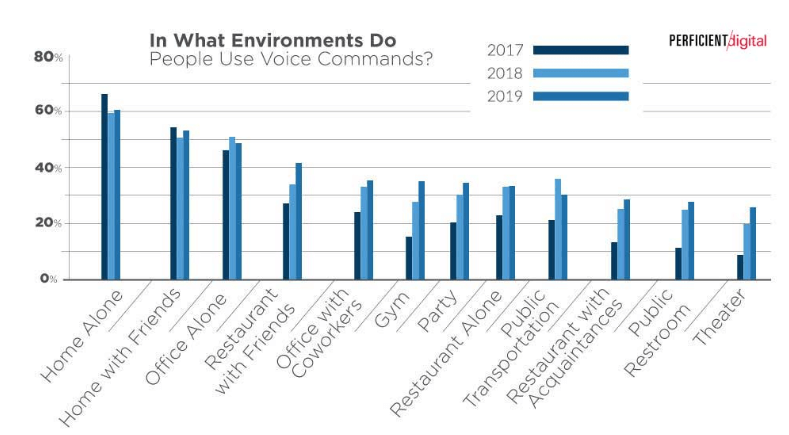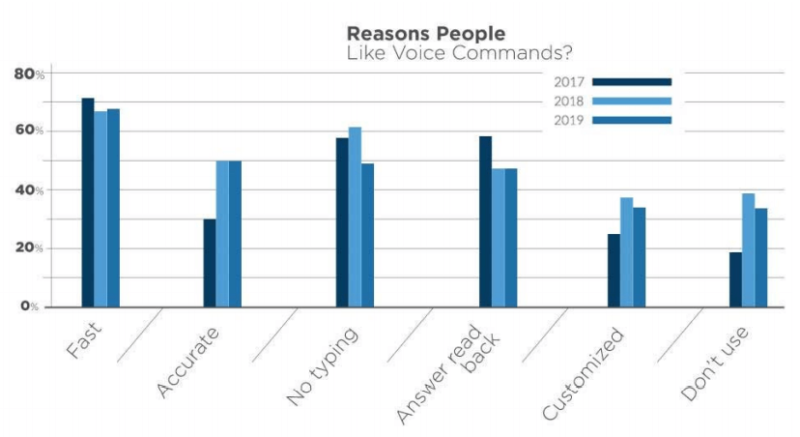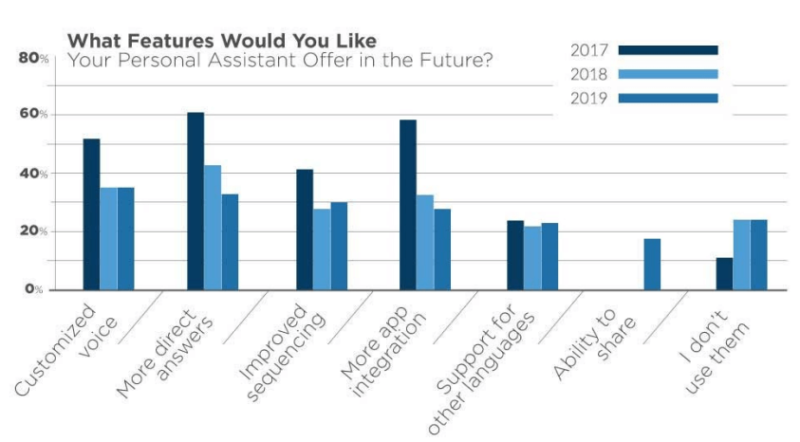Voice gaining on mobile browser as top choice for smartphone-based search
Since 2018, voice has become more users' first choice for mobile search.
We increasingly are talking to our phones in public. That’s the top-line finding of a new study from Stone Temple Consulting (now a part of Perficient Digital). In its third year, the survey polled 1,719 U.S. adults on “how they use voice, when they use voice, and why.”
In nearly every environment people are using voice more than in the past. In 2017 there were considerable inhibitions surrounding public voice usage; almost across the board that has changed. Usage is still highest, however, at home or alone (at the office).
Search in 6th place. Voice is used more often to initiate communication (calling, texting), get directions or play music than it is for most other online activities. In this survey, “online search” was cited by roughly 23 percent of respondents as an “application” they’ve controlled by voice. This figure is low compared with other surveys.
According to the findings, the group most inclined to use voice commands was married males, between 25 and 34 years old, making more than $100,000 per year, with post-college education. Survey respondents overall said they liked voice commands because of speed, accuracy and the absence of typing. Roughly 47 percent also liked the fact that the answer was read back to them by an assistant.
Voice a top choice for search. Asked about their top choice or entry point for mobile search, the answers in order were:
- Mobile browser
- Voice search
- Phone’s search box/window
- Search app
- Text a friend
From 2018 to 2019, voice search grew as the first choice at the expense of the mobile browser, which still retained the top spot. However, as the chart above indicates, voice search was less common than using voice to make calls or obtain directions (a form of search).
Majority happy with virtual assistants. The survey also asked questions about virtual assistants. Just over half (53 percent) said that Siri, Google Assistant or Cortana understood them “well” or “very well.” And 54 percent said that they “agreed” or “strongly agreed” with the statement that voice commands made using their phones easier. More than three-fourths (78 percent) said they were comfortable accessing virtual assistants using wake words like “OK Google” or “Hey Siri.”
One of the final questions asked respondents what future capabilities or features they’d like in virtual assistants. In 2017 the top response was “more direct answers.” However, that interest seems to have died down, perhaps as expectations have moderated or as users have become satisfied with the current state of the voice user experience.
Why you should care. It’s more important to pay attention to how the responses have changed over time (the trend) than the specific percentages. Three years of data show that voice has become more mainstream and more people are comfortable talking to their phones in public.
The survey doesn’t break out speech-to-text input versus use of digital assistants. But we can assume that some meaningful percentage of voice search in the survey is being initiated with Siri or the Google Assistant. And as that figure continues to grow, best practices surrounding content optimization for voice and use of structured data should be utilized.
Contributing authors are invited to create content for Search Engine Land and are chosen for their expertise and contribution to the search community. Our contributors work under the oversight of the editorial staff and contributions are checked for quality and relevance to our readers. Search Engine Land is owned by Semrush. Contributor was not asked to make any direct or indirect mentions of Semrush. The opinions they express are their own.






